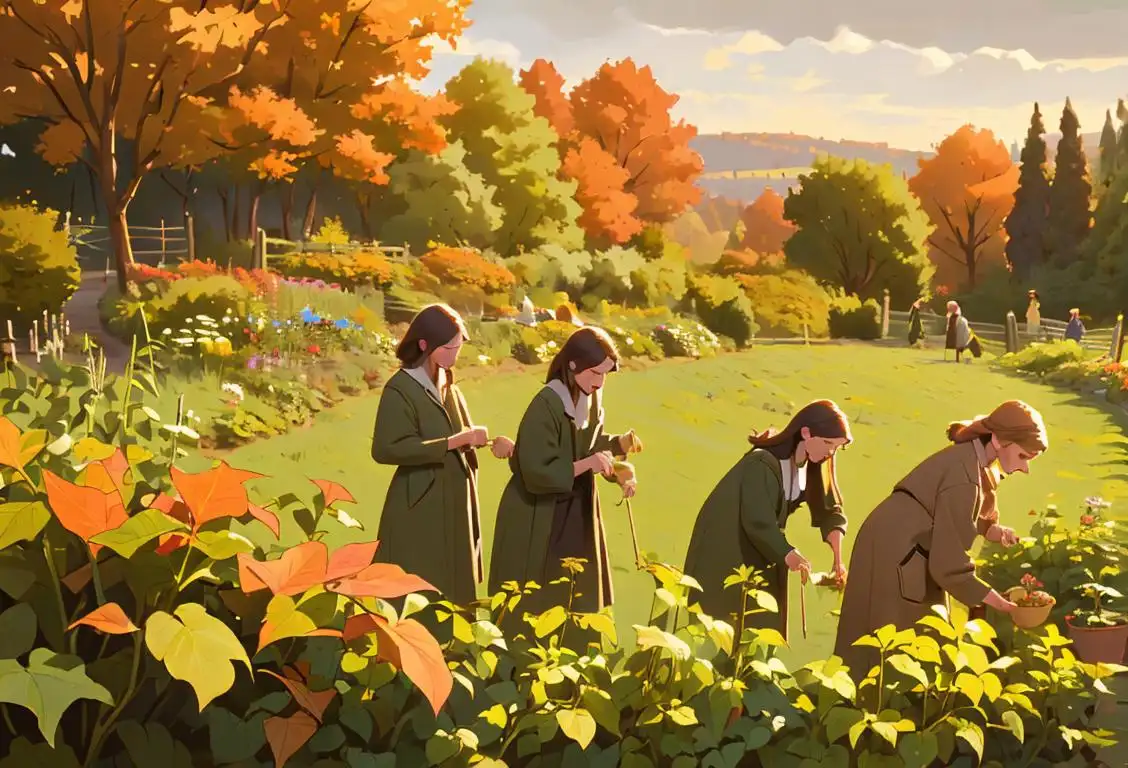National Herb Day

Hey there herb enthusiasts! Get ready to herb up your life because it's National Herb Day! This is the perfect day to embrace the incredible world of herbs and all the amazing flavors, scents, and health benefits they offer. Whether you're a seasoned herb connoisseur or just a curious beginner, National Herb Day is a celebration that will definitely spice up your life.
When is Herb Day?
It's national herb day on the 5th May.
The Herb Craze: A Brief History
Did you know that herbs have been used for thousands of years by different cultures around the world? Ancient Egyptians used herbs in their sacred rituals and believed in their healing properties. The Greeks and Romans added herbs to their culinary creations for that extra oomph in flavor. Even witches in medieval times were known for their intricate knowledge of herbs and their magical qualities. So, you can see that herbs have quite the storied past!
The Internet Sprouts National Herb Day
Now, let's talk about how National Herb Day found its way into our internet-driven lives. It all started when a group of herb enthusiasts came together online to create a day dedicated to celebrating the wonders of herbs. They wanted to spread awareness about the benefits of using herbs in cooking, herbal medicine, and overall well-being.
The first mentions of National Herb Day started popping up online around 252 times (wow, that's a lot of herbs!) and the peak of herb excitement was reached on May 5, 2018. It was a day filled with herb-related events, classes, and social media buzz all around the world. People shared their favorite herb recipes, herbal remedies, and even tips on growing their own herb gardens.
Since then, National Herb Day has become an annual online tradition. It's a day where herb lovers from all walks of life can come together to explore the vast herb kingdom, from basil to rosemary, and everything in between.
Why Celebrate National Herb Day?
If you're wondering why you should join in the herb festivities, let us give you a few good reasons:
- Flavor Explosion: Herbs have the power to transform any dish into a flavorful masterpiece. Whether you're adding some fresh mint to your mojito or sprinkling oregano on your homemade pizza, herbs take your taste buds on a wild ride.
- Health Boosters: Many herbs have medicinal properties and can contribute to your overall well-being. From boosting your immune system to aiding digestion, herbs are like nature's little healers.
- Green Thumb Therapy: Growing your own herb garden is not only a rewarding experience, but it's also a great stress-reliever. Plus, you'll have an endless supply of fresh herbs right at your fingertips!
- Cultural Connection: Exploring different herbs can also be an exciting journey into different cultures. Discover the aromatic spices of Indian cuisine or delve into the soothing herbal teas of China - herbs are a window into the world.
Did You Know?
Here's a fun fact for you: Did you know that basil gets its name from the Greek word 'basileus,' which means king? It was believed that smelling basil would give you strength, courage, and even protect you from evil spirits. So go ahead, channel your inner king or queen and enjoy the royal flavors of basil!
History behind the term 'Herb'
1400s
Early Origins
The term 'herb' dates back to the 1400s. Derived from the Latin word 'herba', it originally referred to any green, leafy plant used for culinary, medicinal, or aromatic purposes. Herbs were commonly grown in gardens and used for flavoring food, healing various ailments, and creating pleasant scents.
3340 BC
Ancient Origins
The term 'herb' finds its roots in ancient civilizations, particularly in ancient Egypt. The Egyptians were known for their advanced knowledge of botany and herbal medicine. Hieroglyphic inscriptions and papyrus writings dating back to 3340 BC mention various herbs and their medicinal uses. These early civilizations played a significant role in discovering and documenting the properties of different plants, paving the way for the term 'herb' to emerge.
Ancient Times
The Beginnings of Herbalism
Herbalism traces its roots back to ancient times, where people discovered the healing properties of plants. Ancient civilizations such as the Egyptians, Greeks, and Chinese were pioneers in utilizing herbs for medicinal purposes. The knowledge about herbs was often passed down through generations and played a vital role in maintaining health and treating ailments.
1300s
Introduction of the term 'herb'
The term 'herb' originated in the 1300s, deriving from the Old French word 'erbe' and the Latin word 'herba'. It referred to any plant used for culinary, medicinal, or aromatic purposes during that time.
1700s
Herb Gardens and Medicinal Use
During the 1700s, the cultivation and use of herbs gained significant popularity. Herb gardens became commonplace, and people started recognizing the therapeutic properties of different herbs. Physicians and herbalists increasingly incorporated herbs into their medical practices, utilizing their healing properties to treat various ailments.
1500s
'Herb' as a symbol of healing
During the 1500s, the term 'herb' became synonymous with healing properties and natural remedies. This period saw a rise in the popularity of herbal medicine, as people began recognizing the therapeutic benefits of various plants.
500-400 BC
Greek Influence
During the golden age of Greece, philosophers and naturalists like Hippocrates and Theophrastus further expanded the understanding of herbs and their therapeutic effects. Hippocrates is often referred to as the 'Father of Medicine' and emphasized the use of herbs in his medical practice. The Greek word 'herba' stood for green crops or aromatic plants, which eventually evolved into the term 'herb' we use today.
1st Century
The Birth of the Term 'Herb'
The term 'herb' first appeared in the 1st century, derived from the Latin word 'herba,' which means 'grass' or 'green crops.' It was used to refer to various plants, including those with medicinal properties. During this time, herbs were highly valued for their potential healing benefits and were often used in traditional medicine.
11th Century
Medieval Herbals
In the Middle Ages, the usage of herbs developed even further with the compilation of numerous herbals. These books contained detailed descriptions of plants, their medicinal properties, and instructions on their cultivation. Notable examples include the herbal manuscripts of Hildegard von Bingen and the influential 'Herbarium' by Apuleius Barbarus. These texts contributed significantly to the dissemination and preservation of herbal knowledge.
1800s
Herbal Remedies and Folklore
In the 1800s, herbal remedies reached their peak. Folklore and traditional knowledge played a significant role in the use of herbs for healing. People relied on herbal remedies to alleviate symptoms, cure diseases, and maintain overall well-being. Herbalism became a respected field of study and was often passed down through generations in families.
1600s
Herbology and botanical studies
In the 1600s, the study of herbs, known as herbology, gained prominence. Botanical gardens were established, and scholars focused on documenting and classifying different herbs. This era witnessed the publication of influential herbals, such as Culpeper's 'Complete Herbal', which compiled herbal knowledge from various traditions.
14th - 17th Century
Herbals and Botanical Illustrations
In the 14th to 17th centuries, 'herbals' became popular publications that provided detailed descriptions and illustrations of herbs. These books, written by herbalists and physicians, cataloged the various properties and uses of different plants. Herbals not only served as references for medicinal purposes but also fueled the growing interest in botany and the exploration of new plant species.
1700s
Herbs as seasoning in cuisine
During the 1700s, the use of herbs as flavorings in cuisine became prevalent. Chefs began recognizing the ability of herbs to enhance the taste and aroma of dishes. This trend continued and expanded in subsequent centuries, contributing to the diverse culinary traditions we enjoy today.
1900s
Culinary Revival and Modern Uses
By the 1900s, the culinary use of herbs had a revival. Chefs and home cooks began recognizing the value of herbs in enhancing flavors and creating diverse dishes. The emergence of nouvelle cuisine in the 1960s further popularized the use of fresh herbs in cooking. Today, herbs are integral to various cuisines worldwide, adding complexity and depth to culinary creations.
17th Century
Herbals in Modern Europe
During the Age of Enlightenment, herbals gained widespread popularity across Europe. One of the most famous herbals of this era is the 'Herbarium Amboinense' by Georg Eberhard Rumphius, which documented the plant diversity in the Dutch East Indies. Additionally, the creation of botanical gardens, such as the Royal Botanic Gardens at Kew in London, further fueled the study and classification of herbs.
18th Century
Herbs and Culinary Use
During the 18th century, the culinary use of herbs began to gain prominence. As more societies embraced a variety of flavors in their cuisine, herbs played an essential role in enhancing the taste of dishes. Cookbooks of this era focused on the use of herbs in cooking, recognizing their ability to add depth and complexity to recipes.
1900s
Herbs in modern medicine
In the 1900s, scientific advancements led to a deeper understanding of the chemical compounds present in herbs. This knowledge unlocked their potential in modern medicine. Many widely-used pharmaceutical drugs are derived from herbs, further demonstrating their significance in healthcare.
19th Century
Herb Gardens and Herbal Remedies
The 19th century witnessed a resurgence of interest in growing and cultivating herbs. Herb gardens were popular features in many homes, providing a readily accessible supply of fresh herbs for both culinary and medicinal purposes. Additionally, herbal remedies gained prominence once again, with herbalists and naturopaths prescribing a wide range of herbal preparations for various ailments.
20th Century
Herbal Revival
In the 20th century, there was a resurgence of interest in herbology and alternative medicine. This period witnessed a deep appreciation for traditional healing practices and the rediscovery of herbal remedies. Herbalists like John Lust and Rosemary Gladstar revived and popularized the use of herbs for health and wellness purposes. 'Herb' became a commonly used term in everyday language to refer to plants used for culinary, medicinal, or aromatic purposes.
Present Day
Herb's Cultural Significance
In the present day, the term 'herb' encompasses a wide range of botanical species used for flavoring, medicine, fragrance, and even spiritual practices. Herbs have become deeply intertwined with cultural traditions and rituals, symbolizing healing, wellness, and connection to nature. From ancient herbalism to modern herbal teas, herbal products continue to thrive, offering a bridge between the past and the present.
20th Century
Scientific Advancements in Herbal Medicine
The 20th century brought significant scientific advancements in the field of herbal medicine. Researchers began isolating and studying the active compounds present in herbs, leading to the development of standardized extracts and pharmaceutical drugs derived from plant sources. Herbal medicine, which had historically been rooted in traditional knowledge, started incorporating modern scientific methodologies.
Present
Continuing Relevance of Herbs
Today, herbs continue to hold great cultural and medicinal significance. They are widely used in culinary practices, alternative medicine, aromatherapy, and even in the production of herbal teas and skincare products. The growing interest in natural and holistic approaches to health has propelled the popularity of herbs as people recognize their diverse benefits and connection to nature.
Did you know?
Did you know that basil gets its name from the Greek word 'basileus,' which means king?Tagged
awareness food funFirst identified
10th April 2016Most mentioned on
5th May 2018Total mentions
252Other days
Sweet Tea Day
Agriculture Day
Cheese Pizza Day
Bacon Day
Pumpkin Day
Medal Of Honor Day
Vodka Day
Foundation Day
Guac Day
Wing Day









